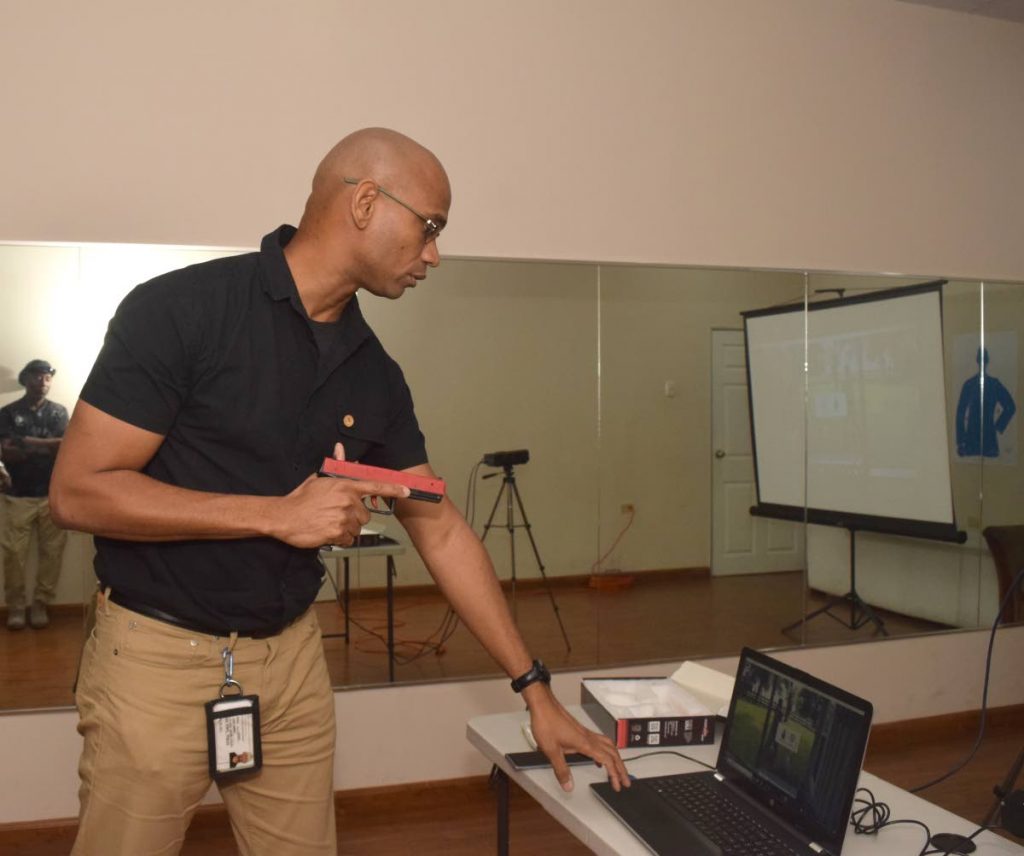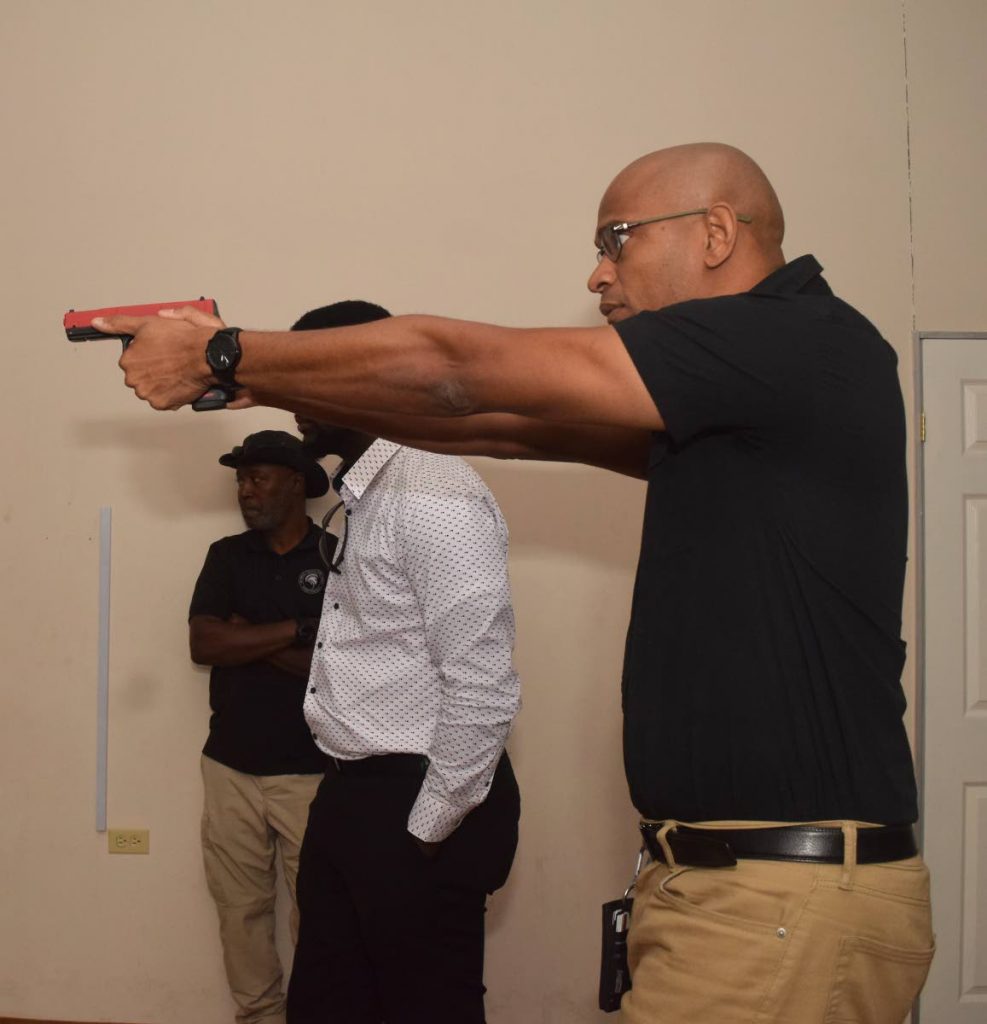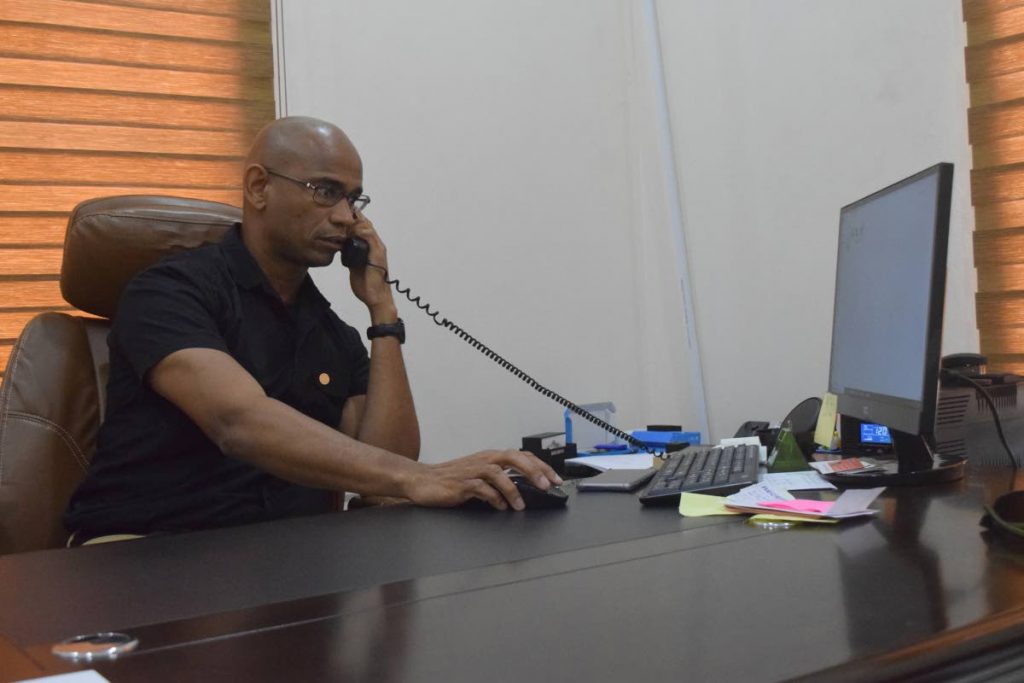The Specialist

IMAGINE being attacked by a gun-wielding thug at a gas station. What would you do? After completing one of several simulations offered to gun owners by Air Support Tactical Ltd at their Valsayn location, my sentiment was simple: “I would have been dead all now!”
The simulation places people in real life situations. Armed with a laser gun, I managed to fire four rounds at my attacker although just one shot hit the target – in the groin. Based on the simulation, however, I would have been shot in the chest before I made my groin shot.
The results of the simulation released a rush of emotion. I felt a helplessness, fear and frustration at my ignorance of how to handle this scenario. And this wasn’t even real.
It’s something retired Major Dirk Barnes, 44, understands. Barnes, Air Support Tactical’s CEO, started the company in 2017 and focuses on training his staff and sometimes members of the protective services, so they can respond to real-life situations, rather than just target practice on inanimate objects. He spoke to Business Day last week at the company’s offices.

Barnes is the former head of the engineering battalion of the TT Defence Force. While enlisted, he trained in information technology. He’s also a graduate of the Royal Military Academy, Sandhurst, UK. He transferred the skills he learnt in the military to create this new endeavour, specialising in asset protection and recovery through GPS tracking. He prefers to hire former military members with advanced tactical training. His services are more expensive than typical security companies but he believes it’s worth it. “I built this company from the ground up. My aptitude is IT and I was trained as an IT professional at the TT Defence Force. I build the codes for all the devices installed,” Barnes said. His company also has anti-jammers coded by him but he refuses to patent it so no one can develop counter measures.
“There are over 400 security companies in TT. There are other companies that offer GPS tracking but not all are 24-hours. I develop my own codes for the GPS trackers and I work closely with my suppliers to embed my software into their hardware.”
Barnes retired from the TT Regiment in 2012 where he spent the latter part of his career in charge of the Infantry Battalion. And he runs his security company with military precision, with paramount respect for service. His officers are well trained to protect assets, but not at the expense of their lives. Safety, Barnes says, is not only a product that the clients receive but his employees as well. The company tracks and protects assets worth an estimated $1 billion – the largest base in the English-speaking Caribbean. Barnes is confident, then, that his company’s work ethic is top tier.

His company is divided into four main units: operations and technical, which offer 24-hour GPS tracking; surveillance, which offers background checks and lie detector testing along with risk assessment profiles; mobile response, which was debuted in Trincity and nationwide hopefully soon; and tactical support, which does asset recoveries.
Barnes leads his company from in front. He trains three times weekly in proper gun use and his officers are mandated to undergo training every two weeks. Training alone cost him $60,000 last year in ammunition but believes that shooting is a diminishing skill that must be sharpened as often as possible.
Barnes has a close working relationship with the TTPS, particularly the Stolen Vehicles Unit, headed by Sgt Christopher Swamber, for vehicle recovery and GPS tracking. His technology and tactical training has helped recover vehicles within hours of being reported missing. His GPS tracking also monitors patterns, so when vehicles are out of their usual route the owners are contacted to ensure that the vehicle wasn’t stolen.
He’s been working with the TTPS for years. In 2011, one of the companies with which he was previously associated, TT Air Support Co Ltd (now defunct), was awarded a $900,000 contract for use of its lightweight surveillance aircraft, the Zenith CH 750, for aerial surveillance for three months in a trial phase. The contract was flagged as suspicious and investigated by five state bodies. Even though the company and the TTPS were cleared of any wrongdoing, the project stalled.
Barnes had hoped to offer the first aerial surveillance to the police service. The business became obsolete, however, when unmanned aerial vehicles (UAVs), commonly referred to as drones, became available commercially.
His “not too pleasant” experience makes him not eager to venture into business with the State, but he does believe that state officials need to enhance their expertise. He offers his services to members of the Ministry of National Security.
And while it doesn’t do any official training with the TTPS, Barnes said police officers have approached the company individually to do their own training.
His next move is to use both ground and air drones, because, he said, that’s where the technology is moving. This reduces the risks of security officers being attacked – or worse – on duty, while still providing top service. He also hopes to add a ballistics expert to his roster as a feature he believes can be used for independent ballistic reports and if needed, testimonies.
Never having fired a gun before, the few seconds in proper stance, given guidance on the correct techniques for holding and aiming, made me feel as though I could corral criminals. It was a sense of invincibility – until the simulation. The moment lasted less than a minute. But had it been real, my whole life could have changed. Barnes takes the model Glock pistol used in the simulation. “I’m a huge advocate for gun safety,” he said. Force-on-force training is therefore a critical component of internal protocol. Guns are force multipliers, Barnes explained. A force multiplier is a term in military science that refers to the exponential increase that technology – weapons – allows the user to accomplish a task more efficiently. With guns, he said, a violent person will use that weapon to elicit more violence, while a calm person might use it de-escalate a situation. It’s one the reasons he believes training is imperative to counteract the inherent violence of criminality.

Comments
"The Specialist"